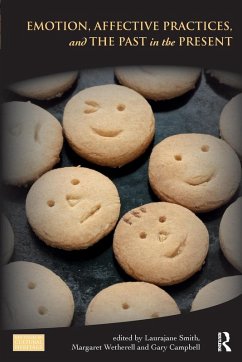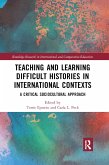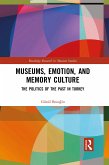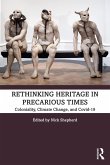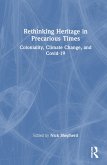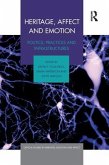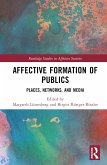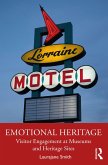Emotion, Affective Practices, and the Past in the Present is a response to debates in the humanities and social sciences about the use of emotion. This timely and unique book explores the ways emotion is embroiled and used in contemporary engagements with the past, particularly in contexts such as heritage sites, museums, commemorations, political rhetoric and ideology, debates over issues of social memory, and touristic uses of heritage sites.
Including contributions from academics and practitioners in a range of countries, the book reviews significant and conflicting academic debates on the nature and expression of affect and emotion. As a whole, the book makes an argument for a pragmatic understanding of affect and, in doing so, outlines Wetherell's concept of affective practice, a concept utilised in most of the chapters in this book. Since debates about affect and emotion can often be confusing and abstract, the book aims to clarify these debates and, through the use of case studies, draw out their implications for theory and practice within heritage and museum studies.
Emotion, Affective Practices, and the Past in the Present should be essential reading for students, academics, and professionals in the fields of heritage and museum studies. The book will also be of interest to those in other disciplines, such as social psychology, education, archaeology, tourism studies, cultural studies, media studies, anthropology, sociology, and history.
Including contributions from academics and practitioners in a range of countries, the book reviews significant and conflicting academic debates on the nature and expression of affect and emotion. As a whole, the book makes an argument for a pragmatic understanding of affect and, in doing so, outlines Wetherell's concept of affective practice, a concept utilised in most of the chapters in this book. Since debates about affect and emotion can often be confusing and abstract, the book aims to clarify these debates and, through the use of case studies, draw out their implications for theory and practice within heritage and museum studies.
Emotion, Affective Practices, and the Past in the Present should be essential reading for students, academics, and professionals in the fields of heritage and museum studies. The book will also be of interest to those in other disciplines, such as social psychology, education, archaeology, tourism studies, cultural studies, media studies, anthropology, sociology, and history.
'Emotion, Affective Practices, and the Past in the Present is a welcome addition to the literature about emotion and affect in heritage studies. The contributors set out to deconstruct theoretically how individuals respond when they encounter heritage in its various manifestations, and how they are affected and what they feel. Particularly helpful are those chapters which rely on visitor studies and move beyond the academy into the field to explore how people engage with the past and relate it to the present in an emotional and affective manner. Thus this book provides students and academics alike with useful insights into the ways in which the turn to emotion has engaged scholars of critical heritage studies, and it will be of use to all who wish to develop a greater understanding of heritage and its impact on individuals and society in general.'
Sheila Watson, University of Leicester, UK
'The objective of this book is to bring forward emotion and affectivity in museum and heritage institutions and studies. As a result, this collected edition is not only timely, it also covers an essential theme in Heritage Studies that has been largely left aside or remains, at best, an implicit element in many professional and academic works.
Simply put, this is a collected edition that should be influential for years to come.'
Jonathan Paquette, University of Ottawa, USA
Sheila Watson, University of Leicester, UK
'The objective of this book is to bring forward emotion and affectivity in museum and heritage institutions and studies. As a result, this collected edition is not only timely, it also covers an essential theme in Heritage Studies that has been largely left aside or remains, at best, an implicit element in many professional and academic works.
Simply put, this is a collected edition that should be influential for years to come.'
Jonathan Paquette, University of Ottawa, USA
'Emotion, Affective Practices, and the Past in the Present is a welcome addition to the literature about emotion and affect in heritage studies. The contributors set out to deconstruct theoretically how individuals respond when they encounter heritage in its various manifestations, and how they are affected and what they feel. Particularly helpful are those chapters which rely on visitor studies and move beyond the academy into the field to explore how people engage with the past and relate it to the present in an emotional and affective manner. Thus this book provides students and academics alike with useful insights into the ways in which the turn to emotion has engaged scholars of critical heritage studies, and it will be of use to all who wish to develop a greater understanding of heritage and its impact on individuals and society in general.'
Sheila Watson, University of Leicester, UK
'The objective of this book is to bring forward emotion and affectivity in museum and heritage institutions and studies. As a result, this collected edition is not only timely, it also covers an essential theme in Heritage Studies that has been largely left aside or remains, at best, an implicit element in many professional and academic works.
Simply put, this is a collected edition that should be influential for years to come.'
Jonathan Paquette, University of Ottawa, USA
Sheila Watson, University of Leicester, UK
'The objective of this book is to bring forward emotion and affectivity in museum and heritage institutions and studies. As a result, this collected edition is not only timely, it also covers an essential theme in Heritage Studies that has been largely left aside or remains, at best, an implicit element in many professional and academic works.
Simply put, this is a collected edition that should be influential for years to come.'
Jonathan Paquette, University of Ottawa, USA

